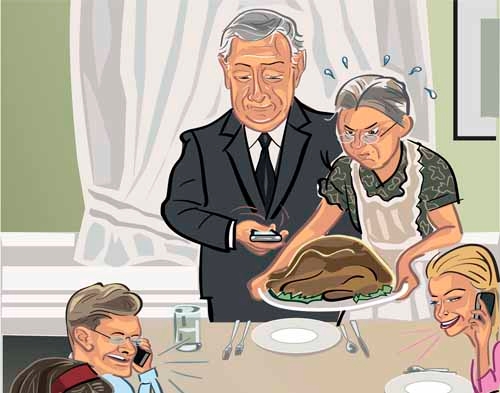Courtesy often victim of obsession with digital devices
Two women, one table, Meadows mall food court.
One giggles a tad too vigorously, as if trying extra hard to convince her companion she's paying attention to her conversation -- before she gives in, eyes plunging to the device in her hand. Her companion leans over to see what's more fascinating than she is. Leaning back out, the companion pulls out her own device.
Two people in a social situation, nothing social transpiring between them, more entranced by slick gadgets and sleek screens -- and likely, other people at the other end of those devices via text, email, Facebook and Twitter -- than each other.
Mutually Assured Distraction.
Yet if technology causes people to commit the same social faux pas with each other, is it really rude, or not a faux pas at all, but simply agreed-upon behavior by all parties concerned? Not always.
"It gets frustrating because they just ignore you and carry on with their conversation on their cellphone," says Edward, an employee at a Valley View Boulevard Circle K convenience store who asked that his last name not be used.
"It's baloney. You should come in and out of a convenience store," says the clerk who, when he's behind the register, wants customers to lay down their dollars without delay. "We're not on anybody's time and you're not on our time. It's very much rude but it happens a lot around here."
Earlier this month, the death of Apple co-founder Steve Jobs spurred tributes calling him a modern-day Thomas Edison, and surely he was. However, Jobs also largely contributed to a condition that's earned its own nickname in the American lexicon -- being "i-rude."
So in 21st-century i-America, what's inconsiderate? What isn't?
"Technology has advanced so quickly that social etiquette and rules and norms haven't caught up," says Michael Ian Borer, associate professor of sociology at the University of Nevada, Las Vegas. "But development has always affected human relations. I always think of that great scene from Kubrick's '2001' when he picks up the bone to crush the skull, which was the first time we started using tools. And that changes everything."
Americans aren't exactly enamored with each other when it comes to "mobile etiquette," either. Earlier this year, a study sponsored by Intel Corp. found that 75 percent of U.S. adults say techno-manners are worse than they were in 2009.
One complaint -- drivers texting -- has been addressed in new laws banning it, including, recently, in Nevada. However, given that hands-free cellphone use is still allowed, bad manners toward other car passengers is likely still prevalent. Call it Bluetooth rudeness.
Other beefs cited include sending emails or texting while walking, offensive language during public calls, phones ringing and screens lighting up darkened movie houses, "using mobile devices while on a honeymoon" (no word on which gender complained more, so feel free to speculate) and forced exposure to other people's business.
"I really don't like that, which is why I'm doing this out here," says Donna Marie Snyder just after concluding a call on her iPhone after stepping outside a Walmart. "People talking on their phones while you're with them or near them, it's rude. I don't want to hear your business, it's TMI -- too much information."
But if 75 percent of Americans complain about it, is it only the remaining 25 percent who are rude? Or are many of the complainers in denial about their own complicity?
"I have a smartphone and I was a late adopter, but I try to limit my use of it especially in social situations," Borer says. "But my contemporaries will sit down at the dinner table or the bar and put the phone down right in front of them. One eye on the phone and one eye at you."
While adults grouse about techno-tacky behavior that takes people out of the moment with each other physically, younger generations see electronic devices as a gateway to even greater social interaction, even if none of them are, in old-fashioned terms, socializing.
"Youth are much more free and easy, as though their devices are another person at the table," says Dr. Norton Roitman of Las Vegas, who specializes in psychiatry. "If there are four youths at a fast-food restaurant, all using their devices, that's equivalent to a whole crowd. They all could be texting and they seem to accept this without a problem."
Some adults seem torn between traditional manners and the siren song of their gizmos, so the compromise is the awkward steal-a-glance. That is deftly executed by a man at a Denny's on West Charleston Boulevard who, while dining with a woman and another man, leans to the right and away from the table to speedily peek down at his device hanging off his belt, as if he hopes his companions think he's checking to see if his shoes are untied.
"I don't use my phone if I'm dining with my family," says Eduardo Bravo, who mans a cellphone accessory kiosk at Meadows. "I'm having a conversation with them, so I don't think it's necessary to take my phone out. If it's ringing, I answer it, but it's like, 'Can I get back to you? I'm doing something.' At restaurants, you see people eating and they're on the phone. They must not care about the people next to them."
Standards of behavior often are set by a particular group. Acceptance of someone constantly consulting an iPhone or BlackBerry during business meetings likely depends on whether the corporate culture demands complete person-to-person attention at those times, or expects employees to be multitaskers who can divide their attention.
Conversely, social situations are uncertain, and we try to read the cues. "I was at lunch with a few acquaintances," Roitman recalls. "I noticed that when one of them became the social leader of the group, when he picked up his BlackBerry to email or text, everybody else did it at the same time. It was like a break from the interpersonal, everybody went to their device. Then when he put his down, we all finished up."
New acquaintances might have different expectations -- say, people on first dates. If one of the daters is texting, emailing or tweeting all through dinner, how will the other react?
"It's impression management," Borer says. "On a first date you're trying to impress the other. Is it more impressive to be engaged one on one, or is it more impressive to say, 'Hey, I'm a guy in the know and people know me and I'm a popular guy'? The answer is yes to both. In some circumstances, that will play out well, and in others it will play out poorly."
Then there's the unapologetic compulsive device-checkers. As cited in a New York Times story in April, an essay in the TechCrunch blog was titled "I Will Check My Phone at Dinner and You Will Deal With It." In it, author MG Siegler wrote:
"Forgive me, but it's Dinner 2.0. This is the way the world works now. We're always connected and always on call. And some of us prefer it that way."
Technology, Borer adds, has placed us in the middle of a paradox. "We have these devices that allow us to be always on and always available, which means we can be everywhere all the time, which means that we're nowhere," he says.
"It's the dark side of cosmopolitanism. We see being cosmopolitan as a good thing, that you're worldly and culturally omnivorous, but when you're available to everyone, you're available to no one, especially those right in front of us."
Contact reporter Steve Bornfeld at
sbornfeld@reviewjournal.com or 702-383-0256.




























